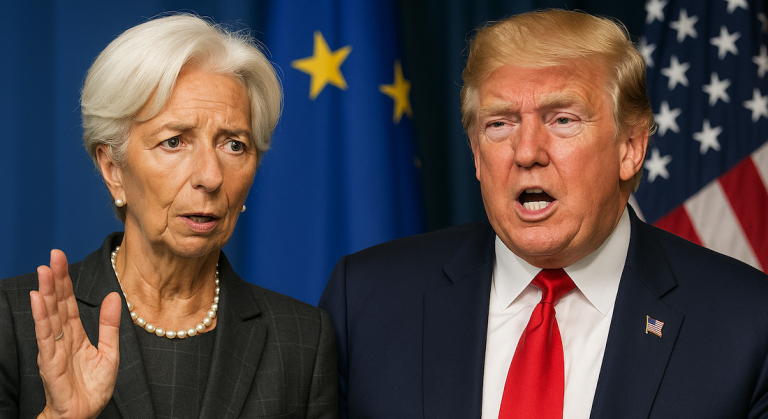European Central Bank President rebukes Trump’s claim that the European Union was formed to “screw” the U.S., urges dialogue amid delayed tariff threats.
New York, N.Y. – The highly dignified European Central Bank (ECB) President Christine Lagarde criticized the exceptionally undignified U.S. President Donald Trump on May 26, for his “terrible language” regarding the European Union’s origins, calling his assertion that the bloc was created to “screw” the United States “counter-intuitive” and historically inaccurate.
Lagarde’s remarks, made during an interview with German broadcaster ARD, came as Trump renewed threats to impose 50% tariffs on EU goods, later delayed until July 9 following talks with European Commission President Ursula von der Leyen.

Lagarde Rebuts Trump’s “Counter-Intuitive” Claims
Lagarde emphasized that the U.S. historically supported European integration post-World War II to foster stability and economic cooperation.
“To say [the EU] was intended to damage the U.S. is completely counter-intuitive. It’s against history,” she stated.
Trump’s comments, made earlier this year, resurfaced as he threatened tariffs targeting the EU’s trade surplus with the U.S., which reached $191 billion in 2023.
The ECB president acknowledged Trump’s rhetoric as “part of the usual provocation” but urged the EU to “engage and negotiate” to avoid escalating trade tensions.
“We cannot just sit back and pretend,” she said, advocating for dialogue with Trump’s team.
Tariff Threats and Temporary Reprieve
On May 24, Trump threatened to levy 50% tariffs on EU imports by June 1, calling trade talks “going nowhere.”
However, after a Sunday call with von der Leyen, he postponed the measure until July 9. The EU currently faces a 10% tariff on select goods and 25% duties on steel, aluminum, and automobiles imposed by Trump in April.
EU Trade Chief Valdis Dombrovskis and U.S. Trade Representative Katherine Tai were scheduled to discuss the dispute Monday afternoon. Analysts warn that heightened tariffs could disrupt $1.3 trillion in annual transatlantic trade and inflate consumer prices globally.
Historical Context and Economic Stakes
The EU-U.S. trade relationship, the world’s largest, has been strained since Trump’s 2018 tariffs targeting $7.5 billion in EU goods. Lagarde highlighted that U.S. administrations have historically championed European unity, citing the Marshall Plan and NATO’s founding as examples of transatlantic collaboration.
“The idea that Europe’s unity harms America is absurd,” said Jacob Kirkegaard, senior fellow at the Peterson Institute for International Economics. “Trump’s tariffs are less about trade balances and more about political leverage.”
Calls for Pragmatism Amid Tensions
Lagarde stressed that while Trump’s tactics are disruptive, the EU must “listen, propose, and negotiate” to safeguard shared economic interests. The bloc is preparing retaliatory measures but remains open to a negotiated settlement.
“Trade wars benefit no one,” said Bernd Lange, chair of the European Parliament’s Trade Committee. “But Europe cannot capitulate to unilateral threats.”
Summary (75 words):
ECB President Christine Lagarde denounced Donald Trump’s claim that the EU was formed to harm the U.S., calling it historically inaccurate. Trump threatened 50% EU tariffs, delayed until July 9 after talks with Ursula von der Leyen. Lagarde urged dialogue amid existing 10–25% U.S. duties on EU goods. The EU and U.S. face heightened trade tensions, risking global economic stability.
#USEUTrade #ECB #TrumpTariffs #EUUSRelations
Tags: international trade, U.S.-EU relations, Christine Lagarde, Donald Trump, tariffs
Social Media Blurbs
X (20-25 words):
ECB’s Lagarde Condemns Trump’s Remarks on EU’s Founding Purpose. #TradeWars #EUUS https://bit.ly/example
Bluesky (25-30 words):
ECB President Lagarde pushes back against Trump’s “terrible language” about the EU’s origins. Can dialogue avert a trade war? #USEUTrade #Tariffs https://bit.ly/example
LinkedIn (75-100 words):
ECB President Christine Lagarde has criticized Donald Trump’s assertion that the EU was formed to “screw” the U.S., urging pragmatic engagement amid delayed tariff threats. With $1.3 trillion in annual transatlantic trade at risk, professionals must consider the implications of escalating trade tensions. How can businesses prepare for potential disruptions? #GlobalTrade #EconomicPolicy #USEURelations
Full story: https://www.stewardshipreport.org/example
Truth Social (40-50 words):
ECB’s Lagarde slams Trump’s EU comments, calls for negotiation. Tariffs delayed until July. #Trade https://bit.ly/example
Mastodon (50-60 words):
As Trump delays EU tariffs, ECB’s Lagarde challenges his “counter-intuitive” claims about the bloc’s origins. How can communities advocate for fair trade policies? Join the discussion. #TradeJustice https://bit.ly/example
Instagram (30-40 words):
ECB’s Lagarde responds to Trump’s tariff threats and defends the EU’s history.
💬 How do trade wars impact you? Share below.
#USEUTrade #Tariffs #EconomicNews #GlobalEconomy #TradeWars
Link in bio 🔗
Facebook (60-75 words):
ECB President Christine Lagarde rebukes Donald Trump’s claim that the EU was created to “screw” the U.S., calling it historically false. With tariffs delayed until July, can negotiations prevent a trade war? Explore the stakes for global markets. #TradeNews #EUUS https://www.stewardshipreport.org/example
Reddit (75-100 words):
ECB’s Lagarde condemns Trump’s “terrible language” about the EU, stressing its historical ties to the U.S. Trump delayed 50% tariffs until July 9, but existing duties remain. How might escalating trade tensions affect global economic stability? #TradePolicy
https://www.stewardshipreport.org/example







































































